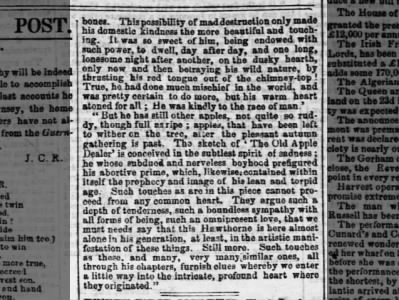
Update 3/11/2020: Gary Scharnhorst first located this item which is listed as number 78 in the second of his two-part article,
"Melville Bibliography 1846-1897: A Sheaf of Uncollected Excerpts, Notices, and Reviews" continued from Number 74 in Melville Society Extracts 75 (November 1988), pages 3-8 at page 4.The New York Evening Post gave a portion of the "elaborate article" on Hawthorne in The Literary World for August 17, 1850 without venturing to guess the name of the author, identified in the original article as "a Virginian Spending July in Vermont." The second part of Melville's now famous review essay would be published in the Literary World on Saturday, August 24, 1850.
The Evening Post printed "frollicking rudeness" where Melville had written "rollicking rudeness."
From the New York Evening Post, August 21, 1850:
HAWTHORNE.-- A writer in the Literary World, in an elaborate article on Hawthorne's "Mosses from an Old Manse," says:
"Stretched on that new-mown clover, the hill-side breeze blowing over me through the wide barn door, and soothed by the hum of the bees in the meadows around, how magically stole over me this Mossy Man! and how amply, how bountifully, did he redeem that delicious promise to his guests in the Old Manse, of whom it is written--"Others could give them pleasure, or amusement, or instruction--these could be picked up anywhere--but it was for me to give them rest. Rest, in a life of trouble! What better could be done for weary and world-worn spirits? What better could be done for anybody, who came within our magic circle, than to throw the spell of a magic spirit over him?" So all that day, half buried in the new clover, I watched this Hawthorne's 'Assyrian dawn, and Paphian sunset and moonrise, from the summit of our Eastern Hill.'
"The soft ravishments of the man spun me round in a web of dreams, and when the book was closed, when the spell was over, this wizard 'dismissed me with but misty reminiscences, as if I had been dreaming of him.'
"What a mild moonlight of contemplative humor bathes that Old Manse!--the rich and rare distilment of a spicy and slowly-oozing heart. No frollicking rudeness, no gross fun fed on fat dinners, and bred in the lees of wine,--but a humor so spiritually gentle, so high, so deep, and yet so richly relishable, that it were hardly inappropriate in an angel. It is the very religion of mirth; for nothing so human but it may be advanced to that. The orchard of the Old Manse seems the visible type of the fine mind that has described it--those twisted and contorted old trees, 'that stretch out their crooked branches, and take such hold of the imagination, that we remember them as humorists and odd-fellows.' And then, as surrounded by these grotesque forms, and hushed in the noon-day repose of this Hawthorne's spell, how aptly might the still fall of his ruddy thoughts into your soul be symbolized by 'the thump of a great apple, in the stillest afternoon, falling without a breath of wind, from the mere necessity of perfect ripeness!' For no less ripe than ruddy are the apples of the thoughts and fancies in this sweet Man of Mosses--
"Buds and Bird-voices."--
"What a delicious thing is that! 'Will the world ever be so decayed, that Spring may not renew its greenness?' And the 'Fire-Worship.' Was ever the hearth so glorified into an altar before? The mere title of that piece is better than any common work in fifty folio volumes. How exquisite is this: 'Nor did it lessen the charm of his soft, familiar courtesy and helpfulness, that the mighty spirit, were opportunity offered him, would run riot through the peaceful house, wrap its inmates in his terrible embrace, and leave nothing of them save their whitened bones. This possibility of mad destruction only made his domestic kindness the more beautiful and touching. It was so sweet of him, being endowed with such power, to dwell, day after day, and one long, lonesome night after another, on the dusky hearth, only now and then betraying his wild nature, by thrusting his red tongue out of the chimney-top! True, he had done much mischief in the world, and was pretty certain to do more, but his warm heart atoned for all; He was kindly to the race of man.'
"But he has still other apples, not quite so ruddy, though full as ripe; apples, that have been left to wither on the tree, after the pleasant autumn gathering is past. The sketch of 'The Old Apple Dealer' is conceived in the subtlest spirit of sadness; he whose 'subdued and nerveless boyhood prefigured his abortive prime, which, likewise, contained within itself the prophecy and image of his lean and torpid age.' Such touches as are in this piece can not proceed from any common heart. They argue such a depth of tenderness, such a boundless sympathy with all forms of being, such an omnipresent love, that we must needs say, that this Hawthorne is here almost alone in his generation, at least, in the artistic manifestation of these things. Still more. Such touches as these, and many, very many similar ones, all through his chapters, furnish clues, whereby we enter a little way into the intricate, profound heart where they originated."
Links to e-texts online:
- Hawthorne and His Mosses - via Stephen Railton, University of Virginia
Related posts:
- Charleston reprinting of Hawthorne and His Mosses
https://melvilliana.blogspot.com/2019/05/charleston-reprinting-of-hawthorne-and.html
- Book reviews in manuscript at NYPL (including Melville's "Hawthorne and His Mosses")
https://melvilliana.blogspot.com/2017/12/book-reviews-in-manuscript-at-nypl.html

No comments:
Post a Comment